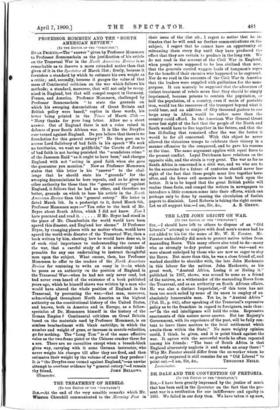PROFESSOR MOMMSEN AND THE " NORTH AMERICAN REVIEW."
[To THE EDITOR OF THE "QPECTkTOR."] DEAR FRIEND,—The " answer " given by Professor Mommsen to Professor Sonnenschein as the justification of his article on the Transvaal War in the .North American Review is so remarkable as to deserve a more extended notice than that given of it in the Spectator of March 31st; firstly, because it furnishes a standard by which to estimate his own weight as a critic ; and, secondly, because it gauges the value of that mass of Continental criticism on the war which follows his methods; a standard, moreover, that will not only be recog- nised in England, but that will compel respect in Germany, France, and America. Professor Mommsen, challenged by Professor Sonnenschein " to state the grounds on which his sweeping denunciations of Great Britain and British policy were based," replies in these words, his letter being printed in the Times of March 27th :- "Many thanks for your long letter. Allow me a short answer. Out of England there is not a voice raised in defence of your South African war. It is like the Dreyfus case turned against England. Do you believe that there is no foundation for this general outcry ?" He then goes on to accuse Lord Salisbury of bad faith in his speech " We seek no territories, we want no goldfields," the Courts of Justice of bad faith in not having punished the " scandalous crime " of the Jameson Raid "as it ought to have been," and charges England, with not "acting in good faith when she gave the guarantee you mention." Now as Professor Mommsen states that this letter is his "answer" to the chal- lenge that he should state his " grounds" for the sweeping denunciations he here repeats, and as he gives no other authority for these than the "general outcry" against England, it follows that he had no other, and therefore no better, grounds on which to base his article in the North. American Review than this " general outcry." His letter is datel March 5th. In a postscript to it, dated March 9th, Professor Mommsen says :—" You refer to the book of Mr. Bryce about South Africa, which I did not know. .lcow I have procured and read it If Mr. Bryce had stood in the place of Mr. Chamberlain the world would have been spared this disaster, and England her shame." If Professor Bryce, by changing places with no matter whom, would have spared the world-wide disaster of the Transvaal War, then a book written by him, showing how he would have done so, is of such vital importance to understanding the causes of the war, that a. careful study of it is absolutely indis- pensable for any one undertaking to instruct thoughtful men upon the subject. What excuse, then, has Professor Mommsen to offer to the readers of the North American Review for venturing to write an essay' in it—in which he poses as an authority on the position of England in the Transvaal War—when he had not only never read, but had never even heard of the existence of a book published years ago, which he himself shows was written by a man who would have altered the whole position of England in the Transvaal, by preventing the war,—that man, moreover, acknowledged throughout North America as the highest authority on the constitutional history of the United States, and known, both in America and in Europe, as a fellow- specialist of Dr. Mommsen himself in the history of the Roman Empire P Continental criticism on Great Britain based on the materials used by Professor Mommsen, is an aimless bombardment with blank cartridge, in which the number and weight of guns, or increase in muzzle-velocities, go for nothing. The "Long Tom" is of the same effective value as the two-franc pistol or the Chinese cracker three for a son. There are, no casualties except when a breech-block gives way, carrying with it some German instructor, who never weighs his charges till after they are fired, and then estimates their weight by the volume of sound they produce ! It is " the Dreyfus case turned against England,"—an unwise attempt to overbear evidence by " general outcry."—I remain






































 Previous page
Previous page